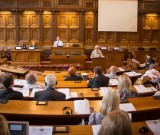July 9, 2014
Basel, Switzerland,
Dr Guy Morin, President of the Basel City Government, opened an international conference in Basel on Friday last week with the question – ‘Can the Organisation for Security and Cooperation in Europe (OSCE) provide a forum and options for resolving current conflicts – such as in the Ukraine, Balkans and Middle East - in peaceful ways? And could this reduce the reliance on military options including nuclear deterrence?'
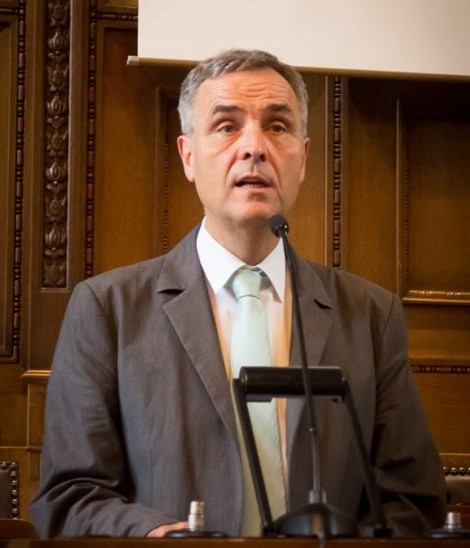
Dr Guy Morin speaking at the OSCE Forum
The question was posed to participants in the Basel OSCE Forum, which brought leading thinkers and policy makers from 24 countries to Basel from July 3-5 to discuss current armed conflicts and other security threats, and to explore the capacity of the OSCE to resolve such conflicts, prevent war and eliminate the reliance on nuclear weapons both in Europe and globally.
Organised by the Basel Peace Office, the forum included mayors, parliamentarians, academics, government officials and representatives of the OSCE, United Nations, Inter Parliamentary Union, International Federation of Red Cross Societies and non-governmental organisations involved in conflict resolution, disarmament and security.
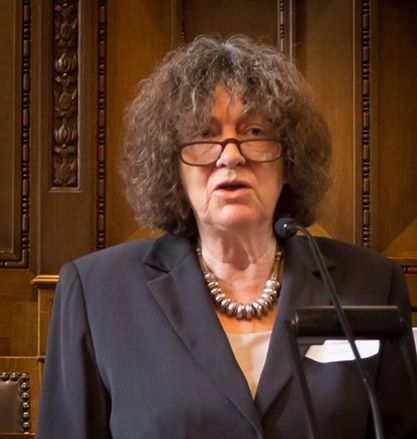
Uta Zapf speaking at the OSCE Forum
'The crisis over Ukraine threatens to bring Europe on the brink of a new cold war,' said Uta Zapf, former Chair of the German Parliament Subcommittee on Disarmament and Arms Control, and Vice-Chair of the OSCE Parliamentary Assembly. The OSCE has been playing a very important role to reduce tensions, foster dialogue between the parties, monitor the situation on the ground and promote peace and conflict resolution. (See Ukraine, a developing story, OSCE Monitoring Mission to Ukraine and Swiss OSCE Chair discusses next steps in implementing peace plan). “We have to support all diplomatic endeavors to resolve the crisis by peaceful means,' said Ms Zapf. 'The OSCE is the organization dedicated to securing peace, indivisible security, confidence-building, arms control, disarmament and human rights. The OSCE is the institution in Europe we need to strengthen.”
The Forum included a focus on nuclear weapons which are intimately linked to current conflicts in Europe and other regions around the world.
“Conflicts in the Middle East are very troubling and involve the proliferation and possible use of nuclear weapons and other weapons of mass destruction,” said Dr Morin. In Europe, “some voices lamented the elimination of nuclear weapons from the Ukraine, hinting that nuclear deterrence might have been able to prevent the current conflict. But is reliance on nuclear deterrence the right response?”
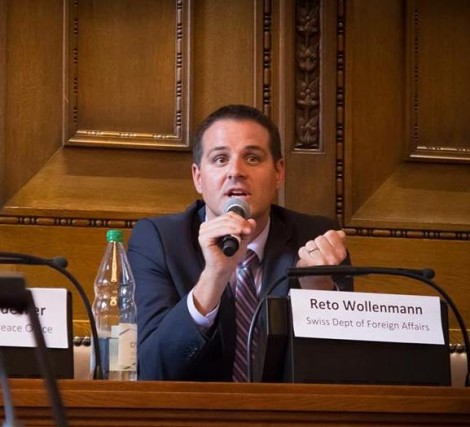
Reto Wollenmann
“Nuclear weapons present a real danger to peace & stability as well as to human security” noted Reto Wollenmann, political affairs officer with the Swiss Federal Department of Foreign Affairs. “Around 1600 nuclear weapons are still kept on a high level of readiness – in other words they can be fired within minutes…They are incredibly powerful and uniquely destructive weapons, which, if used, whether by accident, miscalculation or intentionally, would cause unacceptable harm. They are weapons of mass destruction.”
Yet despite this reality, there is very little media or political attention about the serious risks from the nuclear weapons deployed in nine OSCE countries. Another 21 European countries – the other members of NATO - contribute to this risk by maintaining nuclear-use doctrines as part of their collective security policy.
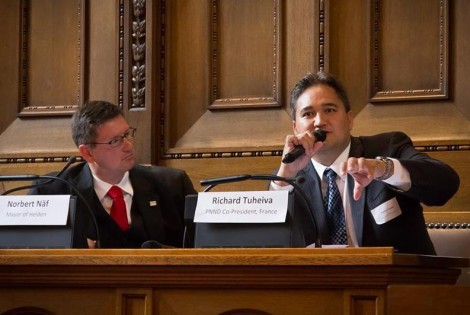
Senator Tuheiava and Mayor Norbert Naef
'The threats to our health and our environment from nuclear weapons, that also threaten future generations, are virtually unknown, ignored or forgotten by most of the 57 Member States of the OSCE,’ said French Senator Richard Tuheiava. The experience of nuclear tests in the Pacific demonstrates ‘the ravages of nuclear weapons… Leukemia, thyroid cancer and other cancers known to be radiation induced, are rampant in all territories or countries affected by these experiences. Since 2010, French Polynesia, which now hosts 275,000 inhabitants, faces 640 new cases of cancer every year. Formerly inhabited atolls and ancestral lands are permanently or partially prohibited from any permanent human activity.'
'Nuclear weapons create uncertainty and insecurity,' argued Dr Ute Finckh-Krämer, Member of the German Bundestag Sub-committee on Disarmament and Arms Control. 'One important first step would be to significantly reduce the role of nuclear weapons inside NATO and then to back this up by developing alternative security concepts. Building on this, it would then be possible for NATO to fully renounce nuclear weapons as part of its strategy.'
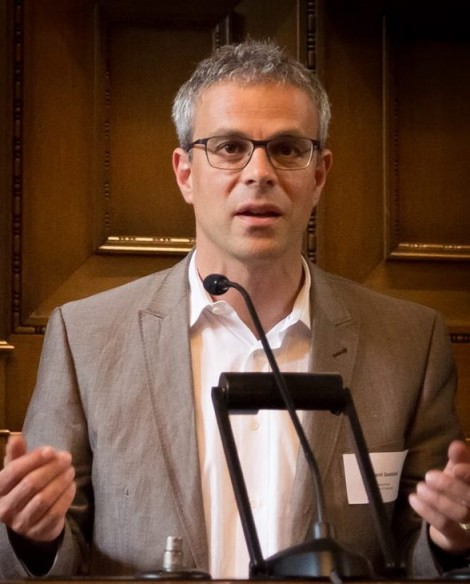
Prof Laurent Goetschel
Prof Laurent Goetschel, Executive Director of swisspeace, notes that 'We cannot wait for international peace to be realized in order to get rid of nuclear weapons. However, the elimination of nuclear weapons would represent an important step towards international peace. Nuclear weapons form part of regional conflict contexts such as in the Middle East. Any significant promotion of peace thus entails coming to grip with the issue of nuclear weapons.’
Colin Archer, Secretary-General of the International Peace Bureau - a Nobel Laureate organisation - noted that the insanity of nuclear weapons is a bit like the insanity of the practice of dueling. 'Because you had an ‘honour’ to protect (read: ‘national security interests’) you were prepared to risk your own life, possibly both lives, in a short murderous battle which proved strictly nothing regarding the moral character of either contestant – and therefore resolved none of the issues leading to the conflict.' Archer reflected that a combination of common sense, moral repugnance towards the practice and application of the law against dueling (along with other legal mechanisms to resovle conflicts) led thankfully to dueling being abandoned by the late 19th century. Sadly, dueling between countries with weapons - including even nuclear weapons - is still not abolished.
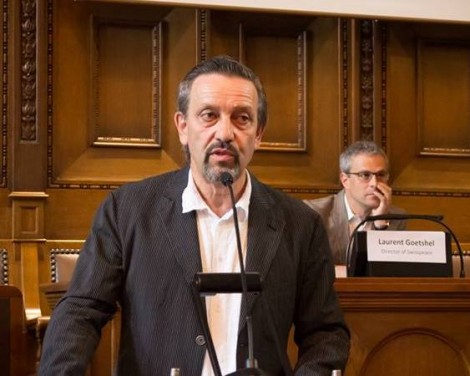
Prof Andreas Nidecker and Prof Laurent Goetschel
Prof Dr Andreas Nidecker, President of the Basel Peace Office, noted the significance of establishing the Peace Office in Basel and in holding the OSCE events here. 'Basel over the centuries has repeatedly been a venue for important peace treaties and has stimulated many peace related activities. These include the 1499 ‘Peace of Basel’ agreement which ended the Maximilian/Suabian war and lead to the formation of the union of Switzerland, the 1795 the 'Treaty of Basel' between the King of Prussia and France, and the 1912 Peace congress of the Socialist International...In addition, Basel is where in 1958 Carl Jaspers wrote his influential thesis on “The nuclear bomb and the future of man.“
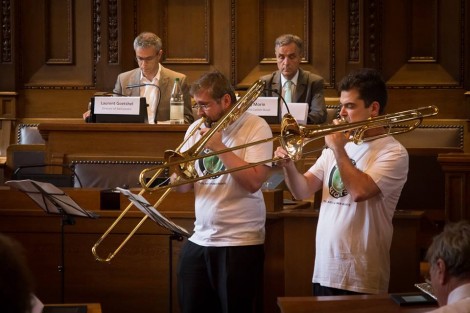
Play for Rights performing at the OSCE Forum
The Basel OSCE Forum included performances by Play for Rights, and a Bike Ride to the Tri-Countries Corner (intersection of France, Germany and Switzerland) led by Mayor Vestby (Norway) one of the leaders of the World Bike Ride for Peace. Mayor Vestby was also a speaker at the Forum. See Basel OSCE Forum speaker on world bike ride for peace.
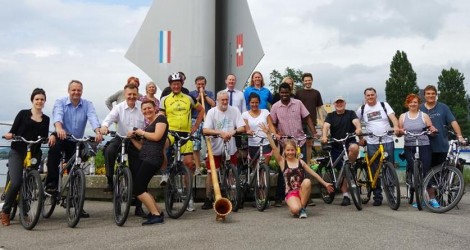
OSCE Forum cyclists at the Tri-Country corner
The Basel OSCE Forum was the first in a series of civil society events in Basel promoting the role of the OSCE and the OSCE Ministerial Meeting which will be hosted by Basel in December 2014. The next main event will be the opening of the Making Peace exhibition which will be exhibited outdoors along the banks of the Rhine.
For more information see
-
Telebasel (the Basel TV station) interview:
– Original on Telebasel site (in German) scroll to minutes 4:15 to 7:49 in the program
- Basel OSCE program with English sub-titles - Basel OSCE Forum – program, speeches and other articles
- Basel OSCE Forum photo gallery
